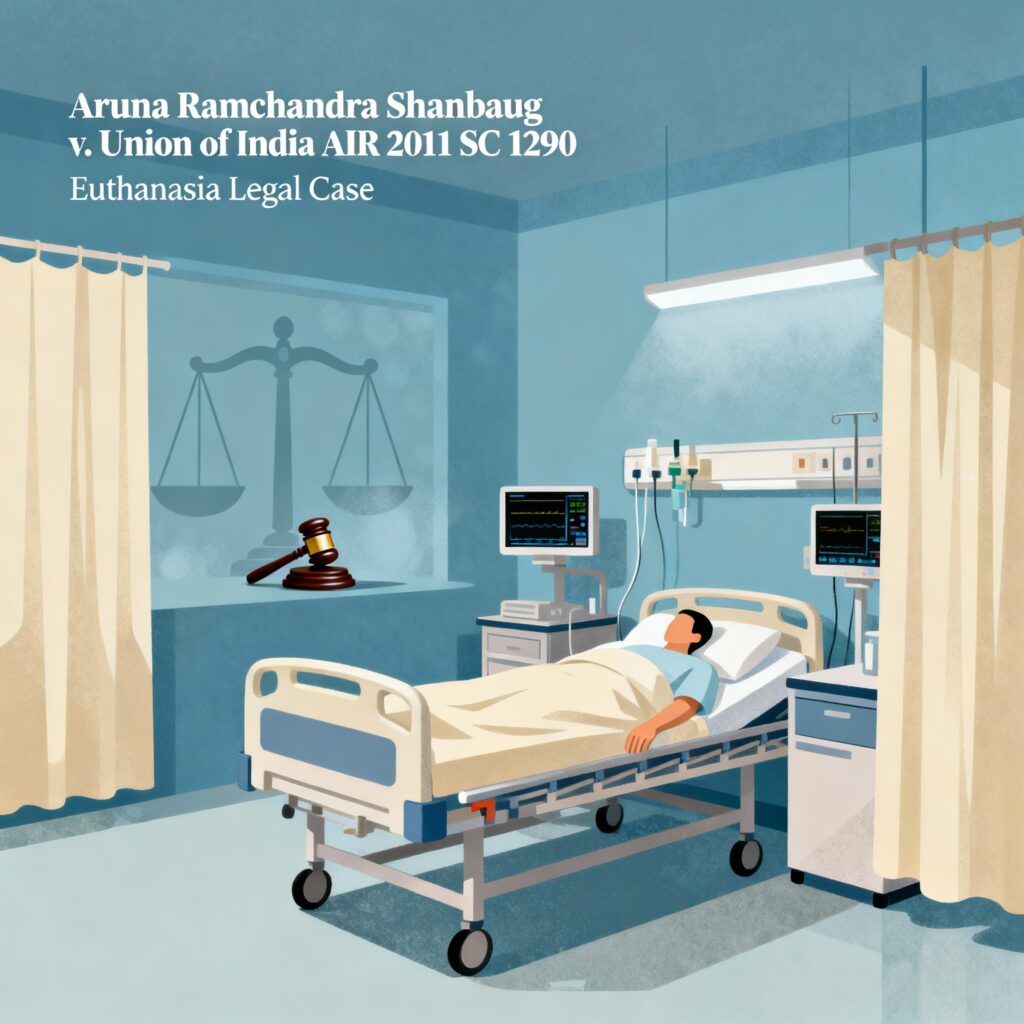Published On: 26th October, 2024
Authored By: Anadhi choudhary
University of Jammu
Case Title: Shayara Bano v. Union of India and Ors.
Citation: 9 SCC 1
Petitioner: Shayara Bano and others
Respondents: Union of India, All India Muslim Personal Law Board (AIMPLB), Jamiat Ulema-e-Hind, and Rizwan Ahmed
Court: The Supreme Court of India
Date of Judgment: 22nd August 2017
Bench: Justice Jagdish Singh Khehar, Justice Kurian Joseph, Justice Rohinton Fali Nariman, Justice Uday Lalit, and Justice Abdul Nazeer
Facts:
- Shayara Bano was born on January 1, 1975, in Uttarakhand.
- She married Rizwan Ahmed on November 11, 2002, in a Muslim wedding ceremony.
- The couple had two children, a boy and a girl.
- In 2015, Ahmed started living separately from Bano and their children.
- On October 10, 2015, Ahmed sent Bano a letter containing the words “talaq, talaq, talaq,” divorcing her through instant triple talaq.
- Bano received the letter on October 15, 2015.
- Bano challenged the validity of triple talaq, arguing it was unconstitutional and violated her fundamental rights.
- She filed a writ petition in the Supreme Court on February 23, 2016.
Arguments from the Petitioner:
Shayara Bano argued the following points:
- Triple Talaq is Unconstitutional: Bano argued that triple talaq violates Article 14 (equality before the law) and Article 15 (non-discrimination) of the Indian Constitution, as it discriminates against Muslim women.
- Arbitrary and Capricious: She contended that triple talaq is an arbitrary and capricious practice, allowing a Muslim man to divorce his wife without reason or explanation.
- Not an Essential Part of Islam: Bano argued that triple talaq is not an essential part of Islam and, therefore, not protected under Article 25 (freedom of religion).
- Violates Gender Equality and Dignity: She asserted that triple talaq violates the principles of gender equality and dignity, perpetuating patriarchal norms and discrimination against women.
- Against Principles of Justice, Equity, and Good Conscience: Bano argued that triple talaq is against the principles of justice, equity, and good conscience, as it allows a Muslim man to divorce his wife without ensuring her well-being or financial security.
- Not Recognized by Many Muslim Countries: She pointed out that many Muslim countries, such as Pakistan, Bangladesh, and Tunisia, have abolished or restricted triple talaq, demonstrating that it is not an essential part of Islamic law.
- Indian Muslim Women’s Rights: Bano argued that Indian Muslim women have the right to equality, dignity, and justice under the Indian Constitution, which should take precedence over personal law.
- Need for Legislative Reform: She contended that legislative reforms are necessary to protect the rights of Muslim women and ensure that personal laws align with constitutional values.
By presenting these arguments, Shayara Bano challenged the constitutionality of triple talaq and sought to protect the rights of Muslim women in India.
Arguments from the Respondents:
The respondents, including the Union of India, All India Muslim Personal Law Board (AIMPLB), and Jamiat Ulema-e-Hind, presented the following arguments:
Union of India:
- Triple Talaq is a Matter of Personal Law: The government argued that triple talaq is a matter of personal law and that the courts should not interfere.
- No Legislative Intent to Regulate: The government stated that there is no legislative intent to regulate or abolish triple talaq.
- Reform Should Come from Within the Community: The government suggested that reform should come from within the Muslim community, rather than through judicial intervention.
All India Muslim Personal Law Board (AIMPLB):
- Triple Talaq is an Integral Part of Islamic Law: AIMPLB argued that triple talaq is an integral part of Islamic law and has been practiced for centuries.
- Not Discriminatory: AIMPLB argued that triple talaq is not discriminatory, as it is available to both men and women.
- Protects Women’s Rights: AIMPLB claimed that triple talaq protects women’s rights, as it allows them to exit a failed marriage.
- Court Should Not Interfere with Personal Laws: AIMPLB argued that the court should not interfere with personal laws, as it would encroach on religious freedom.
Jamiat Ulema-e-Hind:
- Triple Talaq is a Religious Practice: Jamiat Ulema-e-Hind argued that triple talaq is a religious practice, and the court should not interfere.
- Not Unconstitutional: Jamiat Ulema-e-Hind argued that triple talaq is not unconstitutional, as it is a matter of personal law.
- Reform is Not Necessary: Jamiat Ulema-e-Hind claimed that reform is not necessary, as triple talaq is a well-established practice.
By presenting these arguments, the respondents defended the practice of triple talaq, arguing that it is an integral part of Islamic law and personal law, which should not be interfered with by the courts.
Judgment of the Court:
The five-judge bench of the Supreme Court delivered its decision in favor of Shayara Bano and others. It declared the practice of triple talaq unconstitutional by a 3:2 majority and directed the legislature to take measures against it.
Majority Judgment (3:2):
Justice R.F. Nariman:
- Held that triple talaq is unconstitutional, violating Article 14 (equality before the law) and Article 15 (non-discrimination) of the Indian Constitution.
- Stated that the practice is not an essential part of Islam and is against gender equality and dignity.
- Observed that the practice is arbitrary, as it allows a Muslim man to divorce his wife without reason or explanation.
Justice U.U. Lalit:
- Concurred with Justice Nariman, holding that triple talaq is unconstitutional.
- Stated that the practice is not an essential part of Islam and is against the principles of gender equality and dignity.
Justice Kurian Joseph:
- Held that triple talaq is not an essential part of Islam and therefore not protected under Article 25 (freedom of religion).
- Stated that the practice is against gender equality and dignity.
- Argued that this form of talaq lacks the sanction of the Quran. He supported his decision with commentary, emphasizing his intention not to create any communal discord. According to him, what is bad in theology cannot be good in the eyes of the law.
Dissenting Judgment (2:3):
Chief Justice J.S. Khehar:
- Held that Muslim personal law is not enacted by the state and that only state-enacted laws are subject to fundamental rights and can be challenged on the grounds that they violate them.
Justice Abdul Nazeer:
- Dissented, holding that triple talaq is an integral part of Islamic law and should not be interfered with.
Key Points:
- The court held that triple talaq is unconstitutional, violating Article 14 and Article 15 of the Indian Constitution.
- The court stated that the practice is not an essential part of Islam and is against gender equality and dignity.
- The court observed that the practice is arbitrary, as it allows a Muslim man to divorce his wife without reason or explanation.
- The court directed the Union of India to enact legislation within six months to regulate Muslim marriages and divorces.
References in the Judgment:
The Shayara Bano case referenced several important cases and legislative provisions:
Cases:
- Mohd. Ahmed Khan v. Shah Bano Begum (1985): A landmark case that led to the enactment of the Muslim Women (Protection of Rights on Divorce) Act, 1986.
- Danial Latifi v. Union of India (2001): A case that upheld the validity of the Muslim Women (Protection of Rights on Divorce) Act, 1986.
- Sarla Mudgal v. Union of India (1995): A case that dealt with the issue of bigamy and the rights of Hindu women.
- Jorden Diengdeh v. S.S. Chopra (1985): A case that dealt with the issue of personal laws and their relation to the Constitution.
- Krishna Singh v. Mathura Ahir (1980): A case that dealt with the issue of personal laws and their relation to the Constitution.
Legislative Provisions:
- Article 14 (Equality before the law) of the Indian Constitution
- Article 15 (Non-discrimination) of the Indian Constitution
- Article 25 (Freedom of religion) of the Indian Constitution
- The Muslim Personal Law (Shariat) Application Act, 1937
- The Dissolution of Muslim Marriages Act, 1939
- The Muslim Women (Protection of Rights on Divorce) Act, 1986
Consequences:
- The judgment effectively struck down the practice of instant triple talaq, making it illegal in India.
- The judgment paved the way for the enactment of the Muslim Women (Protection of Rights on Marriage) Act, 2019, which criminalizes triple talaq.
Analytical Conclusions:
- The Supreme Court declared instant triple talaq unconstitutional, violating Article 14 (equality before the law) and Article 15 (non-discrimination) of the Indian Constitution.
- The judgment reinforced the supremacy of constitutional rights over personal laws, ensuring that personal laws cannot override fundamental rights.
- The judgment is a significant step towards gender equality, as it challenges the patriarchal nature of triple talaq and recognizes the rights of Muslim women.
- The judgment paved the way for legislative reforms, leading to the enactment of the Muslim Women (Protection of Rights on Marriage) Act, 2019, which criminalizes triple talaq.
- The judgment empowers Muslim women, recognizing their rights and dignity, and challenging the patriarchal norms that perpetuated triple talaq.
- The judgment reignites the debate on a Uniform Civil Code, which could lead to a more comprehensive reform of personal laws in India.
- The judgment reinforces the importance of constitutional morality, ensuring that personal laws and practices align with constitutional values.
- Some argue that the judiciary overstepped its bounds by interfering with personal laws and religious practices.
- Others argue that the subsequent legislative reforms (Muslim Women (Protection of Rights on Marriage) Act, 2019) are an overreach, criminalizing triple talaq rather than addressing the root causes of gender inequality.
- The judgment and subsequent reforms have also sparked concerns about community sentiments and the potential for social unrest.
The Shayara Bano case is a significant milestone in the fight for gender equality and constitutional rights in India. While there are criticisms and concerns, the judgment has paved the way for important reforms and reinforced the supremacy of constitutional rights over personal laws.
References:
- Manupatra, ‘Shayara Bano v. Union of India and Ors.’ (2017) 9 SCC 1.
- Indian Kanoon, ‘Shayara Bano v. Union of India and Ors.’ (2017) 9 SCC 1.




